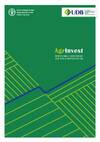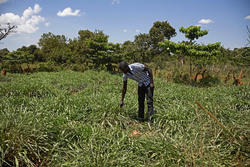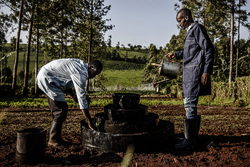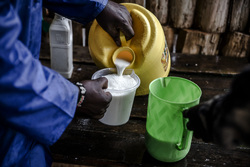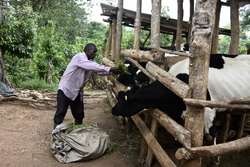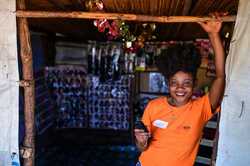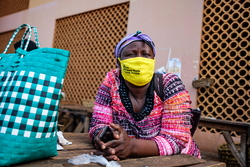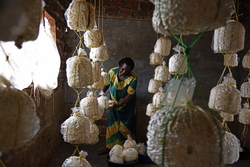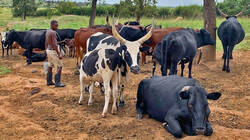
Public funding alone is not enough to tackle the world’s most pressing sustainable development challenges – from ending poverty and hunger by 2030 to reducing inequalities and protecting the health and well-being of people and the planet.
Private investments that generate social or environmental benefits alongside returns can help fill that investment gap, which in developing countries stands at around USD 2.5 trillion.
What is AgrInvest?
AgrInvest, a blended finance initiative of the Food and Agriculture Organization of the United Nations (FAO), uses public funding to attract sustainable private investments in the agrifood sector. More productive, resilient and inclusive agrifood systems will help reduce poverty, hunger and malnutrition, create decent jobs, especially for women and young people, and ensure greater environmental sustainability.
Agriculture is often deemed too risky for financing because of its dependence on weather and seasonal change. AgrInvest focuses on key value chains in a country to help de-risk lending and improve the agricultural investment environment by using the latest assessment and financial analysis tools, digital solutions and policy dialogue.
AgrInvest leverages on FAO’s technical and investment expertise and existing partnerships, global networks and South-South partnerships, including with national finance institutions.
AgrInvest in Uganda
Agriculture accounts for nearly a quarter of Uganda’s GDP and employs two-thirds of the country’s labour force. But Uganda’s agriculture sector lags behind others in attracting investment. With support from the FAO Investment Centre and the European Union Delegation in Uganda, the Uganda Development Bank (UDB) is expanding its agricultural lending portfolio to offer innovative products and services to its clients.
AgrInvest in Uganda seeks to build lasting capacities to leverage responsible investments that transform agrifood systems. And it seeks to increase investment opportunities, including for smaller family farmers – the majority of Uganda’s farmers – who largely fall outside of formal agribusiness value chains.
Here's some key dimensions of the project in Uganda:
- Increased Investing: The project supports the Bank in increasing its investment portfolio in the food and agriculture sectors. The Bank strengthens its capacities to assess business proposals and their risks –making sure proposals are economically viable and environmentally and socially responsible – and, in turn, advises clients on astute financing and business growth. This serves to improve the quality of the pipeline of new proposals over the long term.
- Green Finance: FAO-developed tools like the Ex-Ante Carbon Balance Tool (EX-ACT) and the Global Livestock Environmental Assessment Model interactive (Gleam-i) are being introduced to help the Bank assess the greenhouse gas emissions and carbon balance of loan applications in food and agriculture.
- Policy Dialogue: Policy dialogue and technical assistance will help de-risk and enhance the viability of agricultural investments. Regular dialogue supported by data analysis involving public and private actors along the value chain – from farm to fork – can pinpoint trouble areas and identify solutions.
- Digital Solutions: To enhance the Bank’s lending, the project has teamed up with the UN Capital Development Fund (UNCDF) to increase the Bank’s capacity to use digital technologies – from profiling clients and assessing risks based on geodata, to delivering loans via digital payment systems. This will allow the bank to significantly increase its outreach to small-scale farmers in underserved rural areas.
- Impact measurement: Big data analytics can help the Bank understand how agricultural investments contribute to reducing poverty. Greater capacity to use big data analytics can significantly lower the cost of impact monitoring, and, in turn, contribute to better planning of the Bank’s agricultural activities.
Latest project publications
Latest news
Training in the application of GHG accounting and climate analysis tools for agri-lending
Knowledge of agriculture's environmental impact, as well the capacity to assess the greenhouse gas emissions (GHG) and carbon balance of loan applications is one of the important skills agri-finance institutions need to have while appraising potential clients.
In Uganda, UNCDF, FAO/EU, UDB, working with fintechs Ensibuuko and eMata are partnering to establish and implement a pilot under the AgrInvest initiative to test innovative digital lending models that will catalyse access to credit for smallholders. This session aims to shed light on the rationale for this project, the different models that fintechs will use to advance low-cost digital credit to smallholder farmers and how this will be scaled up by a national development bank. Watch the video from this session below. To find out more about this event, click here.
Good investment needs a good policy environment.
With that in mind, FAO’s AgrInvest Uganda is teaming up with two Ugandan institutions and FAO’s Monitoring and Analysing Food and Agricultural Policies (MAFAP) programme to advance the country’s dairy and beef industries through evidence-based policy dialogue.
Limited access to credit is one of the biggest roadblocks young Ugandans face in doing business in their country – something the Uganda Development Bank (UDB) is hoping to change.
Through the joint European Union and FAO AgrInvest project, UDB seeks to provide business development services to young agripreneurs to strengthen their capacity, market entry and bankability.
The Uganda Development Bank (UDB), a national public bank, is boosting its agri-food lending portfolio via the joint European Union and FAO AgrInvest project.
In early 2021, AgrInvest began collaborating with Dalberg Data Insights to pilot the use of big data analytics to assess the impact of the Bank’s loans on reducing poverty.
Investing in food and agriculture, like all investment, carries risks. How to better understand and manage those risks was the topic of a series of online trainings the FAO Investment Centre delivered to the Uganda Development Bank in September.
Around 15 staff from the Bank’s Investment, Credit and Risk divisions participated in each of the four sessions.
Related links
- Agrinvest project page in the Uganda Development Bank website
- Uganda Development Bank
- European Union
- European Union Delegation in Uganda
- GLEAM-i
- Ex-Ante Carbon Balance Tool (EX-ACT)
- UN Capital Development Fund (UNCDF)
- The Monitoring and Analysing Food and Agricultural Policies (MAFAP) programme

